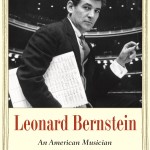
Post-Nostalgia Poster Child?
If Pokey LaFarge is post-nostalgic, it is only partway. If anything, his music and personae expose the extent to which older, simpler virtues—for worse and for better—survive in St. Louis in so many ways.

If Pokey LaFarge is post-nostalgic, it is only partway. If anything, his music and personae expose the extent to which older, simpler virtues—for worse and for better—survive in St. Louis in so many ways.

Bourbon Street: A History takes a single street as its focus to reveal the multiple overlaps and interrelations of different cultures and different histories. This method has its costs, at times exchanging topical breadth for depth.

Marcus’s chosen form, media’s coveted “listicle,” is of the moment. But, at first glance, his subject matter is not. Who even talks about “rock ’n’ roll” anymore?

The facts of Bernstein’s story—the scope of his talents, the velocity of his ascent—still amaze. His natural gifts were embarrassingly rich: ferociously intelligent, musical, and social in equal measures. But Bernstein was also lucky—in the right place at the right time again and again and again.

While Graham retained authority over the use of his voice, it is unclear how much control he exercised. Graham’s appeal seems closer to that of a capable politician than a shrewd marketer in that his greatest coup was getting people from strikingly different walks of life to believe that he both represented their views and could serve as their moral guide.

Hughes gives us a pleasantly dense tale of the shadows in Richard Nixon’s mind that might have been there even without the Chennault Affair—assuming he would have been elected without the Chennault machinations. We can never know if it determined the election outcome, but one major consequence of the Affair that we do know was Watergate.

Franzen’s strength is probing concepts we have been raised to emulate or strive for. The question of how secrets can either fester or come out is treated on practically every page of the novel.

Absent the convention of an “Introduction,” the reader of Debi and Irwin Unger’s new biography of George C. Marshall must get well along in the narrative before its purpose is grasped. From then on, clarity about what the authors are about intensifies: an attempted take-down of the historical reputation of the man generally regarded as America’s finest public servant in the 20th century.

The reign of Frank Rizzo was also the era of the rising black political power in Philadelphia. Nowhere was the clash of racial interests more intense than the police department.

Two new biographies reveal that police work is not so simple and straight-forward—cops versus robbers, order versus chaos—as many might think. Those enlisted in the job of enforcing the law are more complicated in their impulses and motivations, more conflicted or contradictory as human beings about the meaning of what they are doing, than partisans of either side willing to concede.